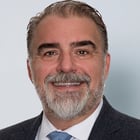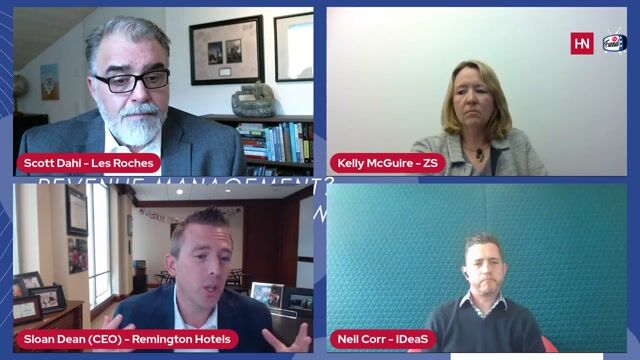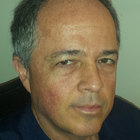Sales, Marketing or RM? - Who will lead the new commercial team?
25 experts shared their view
The question about who should lead the commercial effort has been a debate among hospitality professionals for a long time. Most hospitality leaders would agree that implementing Total Hotel Revenue Management has been more of a mythical destination than a reality, in part due to the territorial obstacles associated with merging the traditional sales, marketing, and revenue management roles into a singularly focused effort. But now the ultimate reset button, COVID-19, presents most organizations with a unique opportunity to build the organization that matches their vision, without the cost (and pain) associated with dismantling an existing team. The big question is: Who is the ideal commercial leader today and what is the most desirable career path an aspiring leader can take to get there?

This World Panel Viewpoint is sponsored by IDeaS a SAS company
More information
The Covid-19 "reset" is providing a huge opportunity to build commercial teams back differently, to better reflect the realities of today's operating environment. I would propose that the answer to "who will lead" is not the discipline that the leaders come from, but the "soft" skills they will bring to the role.
Commercial teams will still need to be made up of specialists with deep domain expertise. The increasing complexity of digital, and its impact on consumer behavior requires this. The leader of this organization must agilely synchronize all demand and revenue generating activities across this diverse team. This means they must be strong communicators, strategic thinkers and have deep business acumen. Communication is the key to ensuring that not only are activities synchronized across the functions within the commercial group, but that goals and strategies are aligned with stakeholders outside the department as well. Leaders need to rise above the day to day and take a more strategic perspective, and must have business acumen to push the team to think differently, but also soundly.
Therefore, the ideal path to this role is to get leadership experience - both of projects and people. You should be targeting roles that have some cross-functional components, and take as many opportunities to present to stakeholders, work on teams with colleagues and to drive and then evangelize results. Ensure you have responsibility for outcomes, and can demonstrate how you achieved them. It will be the softer leadership skills rather than the domain specific skills that will make a truly successful commercial leader and a successful commercial team.
This is a simple question to do, but the consequences of that answer could change the way you organize the sales department. From my point of view, there are two types of companies... those who have completely separated Sales, MK and Revenue and those who have integrated these three areas.
Do you want to break the silos generated by that structure?
In the first type of company, you Will have a lot of problems because you will have three areas with three different objectives and three different bosses.
Instead, if you have everything integrated, Sales MK and Revenue, these silos Will be broken because there is only one department, with only one boss who will lead the whole strategy, For sure this would help to break those silos and have align all these three areas.
But who is going to lead that mega structure?
In my opinion the question is not who… for me the correct question would be … which profile/skills need to have the leader of this area
There are two different answers, and it depends on your business mix and pricing Strategy...
- Companies / Hotels with more yieldable segments or needs in marketing online you will need somebody expert in pricing and online marketing... is this occasion the revenue manager could fit in that, but as I said I would like to speak about skills not about roles.
- Companies /Hotels where their business mix is more traditional, with more non yieldable segments you will need somebody with more knowledge on sales strategies, trade marketing and a huge contact in the industry, in this type of companies somebody with sales skills could lead that department
Whatever option you choose the key would always be creating a great team focus only in one goal … increase the profitability of your property.
You need to have the same goal for these three areas, because in some occasions marketing is focus on advertising ROI, ROAS, the sales team is focus on occupancy and revenue in focus in ADR.
We need to align all our business goals and have a unique KPI, probably the RevPar, GopPar or Gop per Key, this is the key to break the silos.
There are 2 parts to this question: 1) Who is the ideal commercial leader today? and 2) What is the most desirable path a leader can take to get there?
My thoughts on Question #1
- Brand ethos and guest experiences are key in a crowded marketplace flushed with hotel chains.
- Brand is closely aligned to design. A design and brand first approach is key to connecting with guests. A failed product is a commodity.
- A great product boosts loyalty. A great experience boosts loyalty. Loyalty boosts profitability.
- Integrated tech and data should be built around the needs of the guest, brand and product to sustain loyalty.
To me, the ideal commercial leader is one who helps build the brand, understands the importance of solid product design and helps curate and deliver superior guest experiences that builds loyalty. This in turns allows the product / service to charge a premium with staying power. For this, I lean towards the CMO function within the organization. Said differently, sales, revenue management, ecommerce and distribution functions should be integrated under the marketing division.
My thoughts on Question #2
The ideal candidate needs to connect the dots when it comes to product design, brand marketing, PR, analytics, pricing and ecommerce. Not rare to find this; some of the sharpest CMO's / Commercial Heads I have met come from a marketing or revenue management background. Point being, whichever vertical leads you to the commercial role, ensure focus remains on building and sustaining guest loyalty.
"You are doing Sales, because you failed at marketing. You are doing marketing because you failed at product." Source: Twitter handle @Naval , Mar 20, 2022
It's RM, no doubt. As this is the only discipline that truly knows what's going on, as the only data-oriented department in hotel operations.
We already have very many examples in the industry of former revenue managers advancing into C-level roles and becoming successful strategic leaders thanks to their analytical skills, deep understanding of data, and ability to see how different actions by different departments affect the bottom-line profit and operating efficiencies of the entire organization.
Our new digitized reality dictates that data is our new currency. Data is gold. And analytics is our future. And due to the growing importance of data, technology, and analytics, the role of the revenue management department is being redefined and reimagined to become a more central discipline that drives the decision-making for the entire hospitality business. The revenue management (aka Revenue and Profit Optimization) department is becoming a critical piece of the puzzle, that “glues” everything together (sales, marketing, operations, etc.) and feeds the information and decisions to other parts of the organism, where in most cases, profitability is the ultimate goal, with all departments working towards the same metric.
What we're also seeing is that the revenue management (or, revenue and profit optimization) discipline is evolving into something new and very different, broader and more comprehensive (hence the new name: Revenue and Profit Optimization) that is going to help the industry move forward in a more efficient manner. As the distribution landscape becomes more complex and as technology evolves, RPO will continue growing in importance.
Over the past 3 years, there has certainly been a lot of positive evolution within our Commercial Strategy teams, as we continue to find ways to streamline our corporate structure and remove the traditional silos between the different our disciplines.
The Commercial Strategy leader, in my estimation, has less to do with tasks and functions but, in fact, with leadership. As you step into this role, the leader's priorities become more organizational & institutional in nature, focused on optimizing revenue generation, owner relations, marketing & PR, and associate engagement. These priorities are not easily handled if not for the deep knowledge of hotel distribution strategy, analytics, and customer & associate engagement.
Traditionally, the sales leaders have been more developed in softer skills, such as owner and customer engagement, while revenue leaders have been stronger in analytics and distribution strategy. However, in recent years, these traits have become more interchangeable as either side acknowledges that no strong leader can be successful long term if there is not a cohesive response to revenue generation.
An ideal Commercial leader is one who is effective at critical thinking and the decision-making process. A strong leader leans on his team's tactical expertise to advice on the most technical areas. After that, we evaluate the risks and rewards before we make each decision. Regardless of your career path, the keys to develop into a successful commercial strategy leader are diversity of hospitality experiences and the leadership to convey a clear vision for the future.
A strong commercial leader should have a broad understanding of all three disciplines of Sales, Marketing and Revenue Strategy. Progressing through any of the disciplines is possible, however it is the underlying understanding how all three contribute to business success that is important. Having experience in multiple commercial tracks makes a more rounded leader, especially if those experiences are across different markets/business models.
Quite logically the most natural commercial leader today is the person who can understand the levers available to a business to achieve commercial success across disciplines. Having the ability to not just leverage one discipline's core purpose but achieve a multiplier effect by pursuing a multi-discipline strategy is what makes tomorrow's (and some of today's) commercial leaders successful.
It is very encouraging to see a number of extremely capable and innovative leaders emerge recently, including Monica Xuereb at Loews, Chris Silcock at Hilton, and Garine Ferejian-Mayo at Sonesta. Every one of these individuals exemplifies the next generation of commercial leadership in the industry.
First and foremost we need to make sure that we are showcasing commercials in hotels as a career path that is worth pursuing as we have seen industry drainage of talent due to working conditions as well as pay-scale. As a career path you can come up to the top of commercials across all three and where you spent your majority of time will determine which part of the hotels lifecycle your skills will be useful. Key here though is that you need to know all three elements but need to "major" in one. If you chose the revenue management path you will be engaging on a very young path similar to a startup that hasn't found itself, moving along the marketing track will give you great access to data however will most probably be giving you a lot of creative work to do, moving in from a sales background will highten your negotiations and interpersonal skills that are required to make it work.
All three have their advantages and disadvantages. However, at the top, it is not anymore about the hard skills, it's about the soft skills. It's about being able to tap into multiple skills you have acquired over the years and putting those to the best use. And don't forget: by the time you are at the top, whatever we needed today is not what we need then in the future. so don't sweat it, make your mark and create the career of your choice!
In my view - neither! Let me explain. Quite often, at both corporate and property level, Sales, Marketing and Revenue Management specialists and teams operate in isolation from one another, without close coordination. In many cases, they are even in competition with one another to sell the same rooms. In other words, the left hand— one team—does not know what the right hand—the rest of the teams—is doing, to the detriment of marketing efficiency and price integrity and ultimately overall revenue generation, profit, and owner's ROI.
Traditionally, Sales, Marketing and RM operate as separate teams with their own goals, technology tools, databases, vendors, and more. But what is most important, neither of them are being incentivized to increase direct bookings or increase percent of repeat business.
This is one of the main reasons for the troubling trend of missed revenue opportunities, over dependency on the OTAs, alienated loyalty members, and worsened profitability that started even in the pre-pandemic era.
So what is the solution?
In my view the ONLY Solution is the creation of the Integrated Revenue Generation Team. There should be a single-minded team at both corporate and the property: The Revenue Generation Team, consisting of the Sales,Marketing, Revenue Management, but also: CRM specialists and Technologists. This team should be tasked with working together to acquire, engage, and retain guests; optimize performance; and increase revenue, especially direct bookings.
Who will lead this new integrated Revenue Generation Team? A new role is needed at the property or hotel management company: Revenue Generation Manager or Officer, a cross-functional leader, versed in all FIVE disciplines: Sales, Marketing, RM, CRM and Technology.
Here is why CRM and Technology should be integral part of integrated Revenue Generation Team:
CRM:
One glaring example of the current highly fragmented approach is keeping past guest engagement efforts (CRM) in a silo from new customer acquisition and marketing efforts. For example, looking at independent hotels, less than 10%-15% of hotel guests on any given night are repeat guests, while 85%-90% are first-time guests. Acquiring of past guests is 10-15 times cheaper than acquiring new guests.
You cannot have a meaningful repeat business (10-15 times cheaper than acquiring new guests) without a CRM technology and program in place. Only a meaningful CRM technology application - as part of your hotel tech stack - can ensure deep engagement with your past and future guests. CRM tech not only provides automated pre-, during- and post-stay communications, guest satisfaction surveys, guest retention marketing automation and drip marketing campaigns, but takes it a step further via guest recognition program management and loyalty marketing.
All of these fully automated CRM initiatives keep “the conversation going” with your upcoming and past guests, keeps them engaged and steers them in the right direction: to book your hotel when it's time for them to visit your destination again.
In addition, you can use your CRM first party data about your best guests to launch similar audiences marketing on Google, Facebook, Instagram, etc. to target potential customers with similar characteristics as your best guests.
Technology:
The pandemic accelerated digital transformation by 10 years (McKinsey & Company) and today's travel consumers have become more digitally and tech-savvy than ever. Many of today's travelers' service expectations are around self-service, around do-it-yourself, from online planning and booking, to preferences for contactless check-in, mobile keys, voice assistants, and communication with hotel staff via messaging. Serious technology implementations are needed to "appease" these exceedingly tech-savvy guests and their exceedingly high technology expectations.
This new tech-savvy customer plus the acute labor shortages and unattainable labor costs are the reasons why technology is making its way into every aspect of the industry: hotel operations, guest services and communications, revenue management, distribution, CRM and marketing. This necessitates the emergence of a new type of digital transformation leaders and managers - TECHNOLOGISTS- who understand the business applications of technology, the latest technology innovations, trends and best practices in hospitality technology, experts on how to understand, evaluate, choose, implement and manage technology applications in hospitality.
There is no doubt that today's complex travel customer journey requires an integrated strategy to engage, acquire, service, and retain travel consumers across multiple digital touch points and across all digital channels and devices. Only a single-minded team at the property: The Revenue Generation Team, consisting of the Sales, Marketing, RM, CRM and Technology specialists, can optimize guest engagement, acquisition and retention, optimize guest satisfaction and boost revenues and profitability.
The quick answers are: 1) It depends and 2) It depends. OK, I know - that isn't too helpful! Although, it reminds me of a similar question regarding the career path of a GM. Do the best GM's have a background in food & beverage, rooms, human resources, sales, finance or something else? The answer to that question depends on the demands associated with the operation they oversee.
The same holds true for the individual who is best served to lead the commercial strategy. If the property (or portfolio) is group-dependent, then someone with a deep knowledge of group sales could be a good choice. If it is leisure-transient focused, then someone with a strong background in marketing may be the ideal fit. An individual with a working knowledge of revenue management could be the logical choice in either case. OK, so how do we decide?
The considerations in each circumstance should include assessing the ability for the prospective commercial leader to:
- think strategically
- lead a team
- understand what drives both revenue and profitability for the operation
- cultivate a culture of excellence
- communicate effectively with stakeholders (including ownership)
- effectively deal with conflict
- make decisions in the face of ambiguity
- foster collaboration and buy-in
- remain objective
The best advice I can provide regarding a career path is to gain as much experience as you can in as many areas of hospitality as you can. It may take a bit longer to "get there", but the more balanced and well-rounded you are, the more effective you will be as a commercial leader. Oh yeah - and forget the demands of any specific role as you see them today as they are likely to be different tomorrow. Or, at the very least they will evolve. Your job therefore is to garner enough experience in as many areas as you can so that you can remain flexible in your career and draw upon that experience when you need it.
Enjoy the journey!
This is clearly a two-part answer. First, if I were in a position to hire a Chief Commercial Officer TODAY, they would almost surely come from revenue management.
The ability to sell, and lead salespeople, was once enough to earn a spot on the executive committee. Then electronic distribution evolved to become most hotels' primary revenue stream, and with it the role of the revenue manager expanded from button-pushing Excel geek to the key player it is in most successful hotels today. Bright revenue managers with decent communication skills have done well lately. Add brand system knowledge or a little sales experience…jackpot!
For many revenue managers including me personally, it had as much to do with being in the right place at the right time, as it did with being the right person (RM joke…get it?).
Looking ahead however, the most desirable path to become the next Chief Commercial Officer is a different story.
Revenue management may have the upper hand today, but if so, it's only temporary. Expert understanding of pricing and distribution strategy have become the price of entry.
Sales is going to be a key difference-maker during the business travel stage of the recovery. It's one thing to find a new producer on a Hotelligence report, but it's an entirely different thing to chase down the decision maker and convince them to use your hotel.
Marketers will apply new technologies to personalize their message and streamline the mobile booking process, capitalizing on travel consumers' shift away from the internet towards social media in the wake of COVID-19. This is a gamechanger in the battle for direct business, but only for those who know how to use it.
Tomorrow's commercial leaders will need evolve to become masters of all three. The best proof might come from looking at the LinkedIn profiles of leaders who have already emerged through revenue management. Almost all of them include positions in sales or marketing or both.
Nice to know some things never change: Geeks who speak make bank.
The concept of Total Revenue Optimization is by nature a lofty goal, and one that requires an extensive amount of collaboration across teams and departments. That ultimately means that success in the leadership role isn't just about where the title sits in an org chart; it demands a candidate who must and think and act like an owner.
At the end of the day, the main goal is to drive total profit and ensure that the best approach or mix between marketing, sales and revenue strategies is taking place. To accomplish this, the leader of the new commercial team needs to balance a heavy emphasis on the top line with a core understanding and knowledge of bottom-line impact. There is a cost to doing business that extends to all factions of the hotel, from the cost of having a tech stack to knowing how many rooms a housekeeper can clean in a day - and how those costs may impact strategies and business decisions.
To get to this level, a successful team leader must be a good listener, innately curious with a willingness to try new things, and possess an analytical mind that understands costs as well as customer expectations. It requires someone who understands when and how the right technology can keep that revenue alignment intact, with processes in place that not only track successes and failures, but can adapt to changing conditions.
Even when an organization folds Sales, Marketing and Revenue under one commercial organization, the overall objectives do not change. It remains critical that every member of team is working towards the same goals and communicating clearly to ensure individual efforts are not undermining decisions made by other members of the team. That said, this does not mean that each leg of the three disciplines cannot have their own direct KPIs, but at a higher strategy level those individual KPIs still need to drive the big picture results. The leader is the one who needs to listen, learn and align incentives and processes between all three disciplines to achieve success.
I've said many times that this might be just a semantic issue. Take marketing for example: a lot of what I do today would probably be more suitable for revenue managers. Some examples? Expedia Travel Ads. It's an advertising platform, but it's strongly connected to distribution. Who should run it? Someone like me or a revenue manager? Even more: metasearch ads. With these platforms moving from a CPC to a PPS model, they're -de facto-becoming distribution channels. Isn't this the realm of revenue managers? So my two cents is NOT that sales, marketing, and revenue managers should work together toward a common goal, but that we need to prepare the new generation of hoteliers to have a combination of skills from the three professions.
The commercial leader must be able to engage with the team, read and interpret the data coming from different sources (revenue, marketing, digital, sales…), translate and communicate the data and strategy in an understandable language for all the stakeholders to drive the whole team towards one same common goal.
Revenue managers have always been masters of data, therefore the commercial leader is with no doubt the natural evolution of the revenue manager role together with his/her ability to influence, communicate and lead. Nevertheless, the reality is that there have always been biases around the skillset of the revenue manager, still frequently labeled as the technical and analytical resource of the team. These biases are also eradicated in the recruiting process: we still hire revenue managers for their analytical, tech, systems, and data-crunching abilities. These specific skills, when they are not 100% there, can still be learned. On the other hand, the skills like leadership, communication, and visionary attitude (essential skills of the commercial leader), cannot be learned when they are lacking. That's when we see revenue managers struggle to engage with other departments and frictions between roles and responsibilities naturally arise, making the “silo breaking” among departments and the rise of one commercial leader role, hard to reach.
The great revolution towards the shift of the revenue manager to commercial leader starts from the recruiting process, up to the development and career path. We are still too siloed in titles and definitions that, like it or not, unconsciously define and confine who we are and what we do based on history, level of knowledge, and biases. We should probably start being less job title-tied and be open to more fluid work positions that are transversal to all commercial functions.
Promote team goals rather than department goals and develop a leadership culture that must be included in the training and development process. It requires a change of mindset and the nourishment of a team spirit with less hierarchy and shared goals.
Over the pandemic, a lot has been discussed about breaking the silos between these departments. It would be interesting to run an industry poll and check how much of what was discussed has really been implemented, to know where we stand in that front.
But assuming that has been the case, and revenue, sales and marketing and working closer together now, the ideal commercial leader should be a commercially-driven Revenue Manager who works with Marketing to decide together the best actions and campaigns to be launched.
The data that the Revenue Managers deal with is second to none. If treated correctly, it allows us to get a complete picture of every guest over the whole customer journey, which is extremely valuable.
Deciding the marketing actions together, based on that info & trends, should allow Hotels to be more clinical on their campaigns, offers, promotions, etc... being able to target the exact right guest at the precise right time,.... well, you know how the sentence goes.
What changes now on the basic principle of revenue is the accuracy with which those campaigns can be targeted, thanks to those joint efforts. More efficient efforts, achieving better results.
The world of hospitality commercial operations has been changing for the past few years, and the reason many new positions got introduced. The need for a new way forward was realized due to hyper distribution and a digital environment where growing top line and the bottom line took precedence.
But there are hospitality companies that responded to the growing need for a commercially astute structure and leadership by rebranding existing and traditional sales and marketing structures. 'Head of Sales and Marketing' was renamed as 'Head of Commercial' and so on.
The debate around who should lead commercial functions will always continue as different verticals exert different demands, but it is in the interest of hotels to realize that the requirements of a commercial leader are different today. In an article that I wrote last year, 'Age of Commercial Strategist' the focus is mostly on identifying the traits one must seek in a commercial leader.
- Being Strategic – Look long term, sustainable operations, continuous improvements
- Being Data Led – Inculcate data-led culture in decision making and planning
- Being Competitive and Agile – Respond quickly to changing dynamics. Build flexible structures
- Being Total and Net Revenue focused – Maximize wallet share, minimize costs
It is evident that the way forward is to have commercial leaders that can embrace such traits, and the aspirational workforce must build such competencies at some point in their careers to advance.
This is a loaded question and I am tempted to give the boring economist answer of 'It depends'! My last role was Chief Revenue Officer for Taj Group of Hotels (IHCL) which had 100+ hotels with more than a billion $ in top line revenue. My hiring CEO – Mr. Rakesh Sarna and I had debated on what to call the newly created role – CMO, CCO or CRO and we landed on CRO as we thought it sent the right message to the teams on the importance of revenue. I had full responsibility of sales, marketing, revenue management, digital, analytics and consumer facing technology and the role gave me an opportunity to almost force these disciplines to work together – whereas earlier they were siloed with somewhat misaligned goals.
Coming back to the question - it's hard to find a leader for the commercial teams who is an expert in all the three disciplines. The best bet is to find someone who is strong in one field or ideally strong in two (out of Sales, RM and Marketing) and appreciates the value that all three add to overall revenue optimization. Too often, I have seen that the goals and direction of the three disciplines are not aligned. As an example - the Marketing team typically don't like OTAs and prefer only direct business, Sales folks don't like the restrictions that RM apply during high demand dates and the RM teams don't appreciate the hard work that Sales and Mktg put in to bring clients through the door and on the 'top of the funnel' to create demand etc. In reality – all of these are needed for the end goal of total revenue optimization for any hotel.
Eventually the question of 'who will be a good commercial leader' will depend more on personal traits within the pool of candidates who have the necessary functional skills. I have taken a stab at a skill set scorecard that can be used to review commercial leaders. I have also taken the liberty of stereotyping scores from candidates with backgrounds in RM, Sales and Marketing. I am sure this will be controversial but that is the idea. For the record – I am equally fond of all three functions and some of the best commercial leaders I know have come from Sales and Marketing!
Typical scores out of 5 for Commercial leadership candiates with backgrounds in: Hard Skills RM Sales Mktg Functional Expert (atleast one of RM/Sales/Mktg) 3.0 3.0 3.0 Commercial Acumen 4.0 5.0 3.0 Total Revenue Optimization 4.5 3.0 3.5 Quantitative / Analytical / Objective skills 5.0 4.0 4.5 Distribution Strategy 5.0 3.0 4.0 Capex and Technology understanding / planning 3.5 2.5 3.5 Average score 4.2 3.4 3.6 Soft Skills RM Sales Mktg Communication 3.0 5.0 4.0 Leadership 3.0 4.5 4.0 Negotiation Skills 4.0 5.0 4.0 Ability to coach, mentor and share knowledge 4.0 5.0 4.0 Executive presence 4.0 5.0 4.0 Change Mgmt 3.5 5.0 3.5 Average score 3.6 4.9 3.9 RM Sales Mktg Overall score with 50-50 weightage on hard and soft skills 6.0 5.9 5.5 The leader of the business (a GM or a CEO) should eventually decide what type of a commercial leader does the organization need and also the weightages of these criteria (for e.g. technology vs. sales or hard skills vs. soft skills).
To end this article (and not to prove any point) – I received the following lead this week from a recruiter friend looking for recommendations for a CCO:
_____________________________________________________________________________________________
“I have a Chief Commercial Officer opportunity for a top hotel management company in the U.S. The role will focus on all revenue generating channels for the company”. Key points are:
- This can be based anywhere in the U.S.
- They prefer someone who came from Revenue Management
- The company has a mix of full service and select service
The last two years have been a catalyst to break down barriers between departments and disciplines in many hotels. And, the strongest commercial leaders to emerge have been those with a deep understanding of the role each hotel function plays, and the capacity to build cohesive teams driven by common goals.
For so long, Total Hotel Revenue Management has been on the “one day I'll get to it” rainy day jobs list. However, by necessity, businesses have increasingly crafted methods of selling their hotel spaces differently, in light of fluctuating demand. A long-term benefit of this being the retention of ancillary revenue strategies that will continue to boost TRevPAR over time.
Through this process, a way of working that's more coordinated and intelligent is emerging. Revenue managers are sharing their strategies and providing data-based insights (with quantified outcomes) to sales personnel, who are then better able to respond with real-time feedback. Marketers, with access to valuable analytics, are sharing these with revenue managers to establish campaign alignment, and ensure that the right content is shown to the right guest, at the right time, and on the right channel.
Ideally, overseeing this process is a skilled leader who understands these dynamics well, and demands a product toolset that powers the collaboration and efficiency synonymous with optimised teams. Their career path isn't uniform but they do share common traits. Firstly, they have the ability to bring people from differing backgrounds together. Secondly, they have respect for, and knowledge of, how each function operates, and arguably most importantly, they are comfortable in the often rapidly evolving landscape we find ourselves in today.
Therefore the question of “Sales, Marketing or RM? - Who will lead the new commercial team?“ need not be a debate. It's not the career path or job title that will drive commercial success. Rather, its leaders from all backgrounds with strategic intent, deep experience and the best tactical tools at their disposal.
I believe that whatever is the nature of the Sales, Marketing, or Revenue action, the common goal must be "return on investment". If so, then I believe that the right role of the leader who has to manage these 3 important departments is the "Profit Manager". Obviously, this is not a mere definition, but a combination of different skills that could be summarized in the following:
- Analytical: and data-driven decision-making (without data he will be another person with an opinion).
- Creative: let's not forget that we operate in the "Travel" industry and what we communicate and how we communicate it will reflect the value perceived by consumers.
- Communicator: skilled in transforming data and analysis into strategies and clear visions aligned with all the stakeholders (especially when dealing with investors and owners).
- Project manager: we are faced with 3 different roles (historically) aligning them both from a strategic and operational point of view requires the definition of clear and shared procedures.
- People management: behind the analysis, data, technologies, and objectives, there are "people" who often have different attitudes and behaviors.
- A bit like a Champion league team. If there isn't a good mentor to lead the way and keep the group united, the performances will have a hard time being achieved!
It is definitely time to break the silos between the 3 departments and have a figure leading them as a whole team with the same aligned goals. I see this figure as a strategist, who, starting from the data, creates and leads the strategy of the hotel with a big-picture thinking.
I absolutely believe this strategic and commercial role has to come from revenue management, since revenue professionals are data-oriented, are used to set a strategy, targets, to track it, monitor it and adjust it. They are already used to define and consider the S&M actions to take in order to reach the budget or forecast goals and they have an understanding of the impact in terms of results of what is in place. They also have the right expertise on technology. It is also crucial for this leader to have a focus on profitability, and again here a data approach is needed (P&L).
On the other side, as a revenue professional who took up a career path in the sales department in order to complete my CV, I strongly believe this leader coming form the revenue management should have had experience in sales and marketing too, before getting into this position, in order to have the full knowledge to lead the department. That's what many important chains already require and created some programmes for the right candidates to complete their experience.
Not to forget, wherever the commercial leader will come from (and I highlight again it should be from the RM), it is essential to have soft skills like leadership, active listening, emotional intelligence, effective communication and ability to influence and inspire.
As Aristotle once said, “The whole is greater than the sum of its parts.” These words remain particularly poignant today. It may be tempting for a hotel general manager to hand more control to their revenue manager in today's competitive environment, but this would be dismissive to the power of teamwork.
Having a holistic view of risks and opportunities shared by all commercial stakeholders is necessary as everyone has a different point of view, expertise, and area of focus. As demand heats up, leaders need to be tightly aligned and give consideration across all areas of the business (retail, group, transient customer segments, channels, etc.). At the core of these discussions should be a full assessment of market dynamics, not just at the property level, and not just with historical data. The commercial team needs to be armed with the best forward-looking on-the-books occupancy, rate, and market insights in order to make the most informed decisions.
Once this information and guidance is rolled up and distributed across teams, revenue managers, sales leaders, and marketers, they all gain a unified point of view. For smarter revenue strategy decisions, marketing managers know what type of promotions to offer, sales knows when the peak and need periods are, and operations can staff the hotel appropriately to accommodate what's happening and when.
However, that doesn't mean hoteliers can't groom the next generation of leaders more effectively. Since an ideal commercial leader is a well-rounded “generalist”, consider cross training your best and brightest staff members on a regular basis. A front desk clerk that understands operations and how to check-in and direct large groups without overburdening the housekeeping department has the fundamentals to become an excellent salesperson. Connect your personnel with other departments they can learn from and empower them with data so they have a comprehensive view of business needs and performance. This will provide them with the context they need to take the next step in their careers.
The ideal commercial leader has excellent leadership skills - An ideal commercial leader has powerful leadership skills to manage the different personalities of people working in marketing, sales, and revenue management. The job starts with recruiting the team members, creating a commercial strategy for the hotel, put together action plans, budgets, and KPIs. Executing the strategy, collaborating with other departments, and reporting the progress to the CEO/owner are ongoing activities towards optimizing top-line revenue. The leader is probably a negotiator who balances different opinions and interests to reach the best overall decisions. The leader is a people person and can create an engaging commercial culture that attracts talents. A commercial leader needs to build trust within the team, and therefore knowledge of marketing, sales, and revenue management is a must. Consequently, the career path is probably broader than it is deep.
Commercial leaders in different types of hotels - The commercial leader with excellent leadership skills described above is probably working in a company operating several hotels. As always, the ideal leader is a function of the hotel type, size, destination, and many other variables. Therefore, the career path to the commercial leader position in a single hotel is probably different. Here are some examples.
The marketing manager - The marketing manager is probably the ideal commercial leader in a boutique hotel where the focus is on marketing to a specific target group and where the local brand is everything. In this case, the marketing manager can create an understanding of the importance of the brand, target group, concept, and guest experience. An ideal commercial leader in a boutique hotel is a person with a marketing background with knowledge in sales and revenue management.
The sales manager - The sales manager is probably the ideal commercial leader in a large business and meetings hotel where the focus is to build long-term relationships with customers. In this case, the sales manager can create a culture around maximizing the order value, customer relationships, and winning new business. An ideal commercial leader in a business and meetings hotel is a person with a sales background with knowledge in marketing and revenue management.
The revenue manager - The revenue manager is probably the ideal commercial leader in the mega-chain hotel in a high-demand destination with a continuous flow of reservations where heads in beds are the focus. In this case, the revenue manager can create a data- and fact-driven culture where optimization is the main focus to become successful. Therefore, an ideal commercial leader in a mega-chain hotel is a person with a revenue background with knowledge in marketing and sales.
In my opinion, the hybrid commercial team is the future. Revenue management, marketing, distribution, and sales should be part of this team. I know it's easy said than done, but breaking the silos and increasing collaboration is a good start.
Who should lead the commercial team? The revenue manager, and here is why:
Data analytics
Revenue managers have a deep understanding of data. Getting the correct data, analyzing it, creating a strategy, communicating, and implementing the strategy is crucial for commercial success. Decisions should be data-based.Revenue management principles
The revenue professionals have the expertise to educate the hotel's management team on revenue optimization as a whole and how to apply revenue management principles in the respective departments (Spa, F&B, Meetings).Technology
Technology is a vital part of commercial success. It's hard to underestimate the impact of PMS, CRS, RMS, Upsell software, and various BI tools. Revenue managers navigate these systems daily and understand how the business can benefit from all available features and capabilities.What should revenue managers work on to be better commercial leaders? The soft skills. Such as effective communications, ability to influence, agility, collaboration, listening skills, relationship-building skills, ability to adapt, etc. It's not enough to be analytical and understand the strategy. You have to be able to communicate it and lead the team.
The question alone indicates that the hotel industry will have big challenges in its attempt to move forward after Covid. We are perpetuating the mind-set of pre-Covid to create artificial silos and boxes and ask people to "stay in their lanes" - plus we also categorize them based on their backgrounds. The short answer to the original question is - "All of them and it depends"
A big reason why we are asking the question also stems from the fact that Revenue Management is often equated with pricing, inventory management and OTA relationship; Marketing falsely is viewed as advertising and Social Media only in many companies. The question also implies that ONE person can perform all these commercial activities and should consider that a big part of leadership is the development of the team
Two hotels with different market-mix will need two leaders with different skills to maxmize the strength of the property. Most of the time, the great Revenue leader who sees trends simply by looking at a column of data is probably not the person to create an engaging advertising campaign which makes the guest dream about staying at the hotel. The creative Marketing mind or analytical Revenue guru might not have the capability of the Sales dynamo to handle rejection and make friends with the person next to them on the plane. The Sales leader not necessarily has the analytical mindset to look at demand forecasts and draw conclusions from Google Analytics.
Historically, the 4 Ps of Marketing included Price (Revenue Management), Product, Placement (Distribution channels including Group/ Volume Sales, OTAs, Wholesale, Direct etc) and Promotion (Advertising, Awareness). Lately we added 3 more Ps (Packaging, Positioning and People). As we can see, Marketing, Revenue Management and Sales are intertwined and can (or should) not be separated.
Maybe Covid will allow the hotel industry to eliminate the "old" structures and labels and create a new "Commercial Leadership" position which encompasses all of Marketing, Sales and Revenue Management and also helps ownership and GMs in developing the product, services and the culture and team at a hotel. This leader should have a basic understanding of all 3 components and the tools and toys in these areas (yes, these people exist!) - hotels will then appoint leaders who are strong in the particular area which produces the biggest contribution for the property.
A big-box convention hotel in a major convention city probably will want a commercial leader with a strong Group Sales background to train the team, maintain the partnership with past clients, the Convention Center, CVB and ensure that contracts are executed correctly to protect the interests of the hotel.
A hotel with limited meeting space in a high-demand destination (like Miami, New York) which relies mostly on transient business from direct, OTA and volume distribution channels would need a commercial leader who is strong in traditional Revenue management to maximize revenue based on the existing trends
A lifestyle hotel, a property in its opening phase probably will want a commercial leader who has relevant experience in creating awareness and brand-identity, has opened other hotels and has hired and created teams
The industry is asking General Managers of a hotel to understand Front Desk Operations, Housekeeping, Finance, Sales, Revenue Management, HR, Marketing, Facilities Management and to manage owner relations - why can we not ask a Commercial Leader (the General Manager of Commercial Activity) to understand Sales, Marketing and Revenue Manegement
In summary, the hotel industry would be served well to create a "Commercial Leadership" position to combine Marketing, Sales and Revenue Management (plus Product and Team development) under one umbrella. Individual properties will then select a leader whose background is strong in the areas that maximize the existing market-mix or move the mix to a more desired outcome. Aspiring leaders should try to gain experience in all areas of commercial activity and not be limited by being "stuck" in one particular box

This World Panel Viewpoint is sponsored by IDeaS a SAS company
More information


























